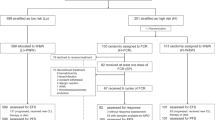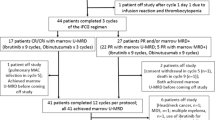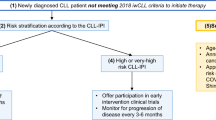Abstract
Lymphoplasmacytic lymphoma (LPL) is an indolent lymphoma with moderate sensitivity to conventional chemotherapy. This study investigated whether the addition of rituximab to standard chemotherapy improves treatment outcome in LPL and the subgroup of LPL patients fulfilling the criteria of Waldenstroem's macroglobulinemia (WM). A total of 69 patients with previously untreated LPL were enrolled into the trial; 64 patients were evaluable for treatment outcome. In all, 48 of the 64 LPL patients fulfilled the criteria of WM. Patients were randomly assigned to R-CHOP (rituximab, cyclophosphamide, doxorubicin, vincristine and prednisone, n=34) or CHOP (n=30). R-CHOP resulted in significantly higher overall response (OR) rate (94 vs 67%, P=0.0085) in the LPL patients and in the WM subgroup (91 vs 60%, P=0.0188). With a median observation time of 42 months, R-CHOP induced a significantly longer time to treatment failure (TTF) with a median of 63 months for R-CHOP vs 22 months in the CHOP arm in the LPL patients (P=0.0033) and in the WM subgroup (P=0.0241). There was no major difference of treatment-associated toxicity between both treatment groups. These data indicate that the addition of rituximab to front-line chemotherapy improves treatment outcome in patients with LPL or WM.
This is a preview of subscription content, access via your institution
Access options
Subscribe to this journal
Receive 12 print issues and online access
$259.00 per year
only $21.58 per issue
Buy this article
- Purchase on Springer Link
- Instant access to full article PDF
Prices may be subject to local taxes which are calculated during checkout




Similar content being viewed by others
References
Stansfeld AG, Diebold J, Noel H, Kapanci Y, Rilke F, Kelenyi G et al. Updated Kiel classification for lymphomas. Lancet 1988; 1: 292–293.
Treon SP, Dimopoulos M, Kyle RA . Defining Waldenstrom's macroglobulinemia. Semin Oncol 2003; 30: 107–109.
Treon SP, Morel P, Leblond V, Fermand JP . Report of the Third International Workshop on Waldenstrom's macroglobulinemia. Clin Lymphoma 2005; 5: 215–216.
Dimopoulos MA, Kyle RA, Anagnostopoulos A, Treon SP . Diagnosis and management of Waldenstrom's macroglobulinemia. J Clin Oncol 2005; 23: 1564–1577.
Papamichael D, Norton AJ, Foran JM, Mulatero C, Mathews J, Amess JA et al. Immunocytoma: a retrospective analysis from St Bartholomew's Hospital-1972–1996. J Clin Oncol 1999; 17: 2847–2853.
Garcia-Sanz R, Montoto S, Torrequebrada A, de Coca AG, Petit J, Sureda A et al. Waldenstrom macroglobulinaemia: presenting features and outcome in a series with 217 cases. Br J Haematol 2001; 115: 575–582.
Dhodapkar MV, Jacobson JL, Gertz MA, Rivkin SE, Roodman GD, Tuscano JM et al. Prognostic factors and response to fludarabine therapy in patients with Waldenstrom macroglobulinemia: results of United States intergroup trial (Southwest Oncology Group S9003). Blood 2001; 98: 41–48.
Leblond V, Levy V, Maloisel F, Cazin B, Fermand JP, Harousseau JL et al. Multicenter, randomized comparative trial of fludarabine and the combination of cyclophosphamide-doxorubicin-prednisone in 92 patients with Waldenstrom macroglobulinemia in first relapse or with primary refractory disease. Blood 2001; 98: 2640–2644.
Tamburini J, Levy V, Chaleteix C, Fermand JP, Delmer A, Stalniewicz L et al. Fludarabine plus cyclophosphamide in Waldenstrom's macroglobulinemia: results in 49 patients. Leukemia 2005; 19: 1831–1834.
Treon SP, Emmanouilides C, Kimby E, Kelliher A, Preffer F, Branagan AR et al. Extended rituximab therapy in Waldenstrom's macroglobulinemia. Ann Oncol 2005; 16: 132–138.
Hiddemann W, Kneba M, Dreyling M, Schmitz N, Lengfelder E, Schmits R et al. Frontline therapy with rituximab added to the combination of cyclophosphamide, doxorubicin, vincristine, and prednisone (CHOP) significantly improves the outcome for patients with advanced-stage follicular lymphoma compared with therapy with CHOP alone: results of a prospective randomized study of the German Low-Grade Lymphoma Study Group. Blood 2005; 106: 3725–3732.
Marcus R, Imrie K, Belch A, Cunningham D, Flores E, Catalano J et al. CVP chemotherapy plus rituximab compared with CVP as first-line treatment for advanced follicular lymphoma. Blood 2005; 105: 1417–1423.
Buske C, Weigert O, Dreyling M, Unterhalt M, Hiddemann W . Current status and perspective of antibody therapy in follicular lymphoma. Haematologica 2006; 91: 104–112.
Lenz G, Dreyling M, Hoster E, Wormann B, Duhrsen U, Metzner B et al. Immunochemotherapy with rituximab and cyclophosphamide, doxorubicin, vincristine, and prednisone significantly improves response and time to treatment failure, but not long-term outcome in patients with previously untreated mantle cell lymphoma: results of a prospective randomized trial of the German Low Grade Lymphoma Study Group (GLSG). J Clin Oncol 2005; 23: 1984–1992.
Owen RG, Treon SP, Al-Katib A, Fonseca R, Greipp PR, McMaster ML et al. Clinicopathological definition of Waldenstrom's macroglobulinemia: consensus panel recommendations from the Second International Workshop on Waldenstrom's macroglobulinemia. Semin Oncol 2003; 30: 110–115.
Weber D, Treon SP, Emmanouilides C, Branagan AR, Byrd JC, Blade J et al. Uniform response criteria in Waldenstrom’s macroglobulinemia: consensus panel recommendations from the Second International Workshop on Waldenstrom's macroglobulinemia. Semin Oncol 2003; 30: 127–131.
Cheson BD, Horning SJ, Coiffier B, Shipp MA, Fisher RI, Connors JM et al. Report of an international workshop to standardize response criteria for non-Hodgkin′s lymphomas. NCI Sponsored International Working Group. J Clin Oncol 1999; 17: 1244.
Solal-Celigny P, Roy P, Colombat P, White J, Armitage JO, Arranz-Saez R et al. Follicular lymphoma international prognostic index. Blood 2004; 104: 1258–1265.
Hoster E, Dreyling M, Klapper W, Gisselbrecht C, van Hoof A, Kluin-Nelemans HC et al. A new prognostic index (MIPI) for patients with advanced stage mantle cell lymphoma. Blood 2008; 111: 558–565.
Dimopoulos MA, Anagnostopoulos A, Zervas C, Kyrtsonis MC, Zomas A, Bourantas C et al. Predictive factors for response to rituximab in Waldenstrom's macroglobulinemia. Clin Lymphoma 2005; 5: 270–272.
Treon SP, Branagan A, Wasi P, Emmanouilides CA, Frankel SR, Lister A et al. Combination therapy with rituximab and fludarabine in Waldenstrom's macroglobulinemia. Blood 2004; 104: 753a.
Tam CS, Wolf M, Prince HM, Januszewicz EH, Westerman D, Lin KI et al. Fludarabine, cyclophosphamide, and rituximab for the treatment of patients with chronic lymphocytic leukemia or indolent non-Hodgkin lymphoma. Cancer 2006; 106: 2412–2420.
Dimopoulos MA, Anagnostopoulos A, Kyrtsonis MC, Zervas K, Tsatalas C, Kokkinis G et al. Primary treatment of Waldenstrom macroglobulinemia with dexamethasone, rituximab, and cyclophosphamide. J Clin Oncol 2007; 25: 3344–3349.
Lenz G, Dreyling M, Schiegnitz E, Forstpointner R, Wandt H, Freund M et al. Myeloablative radiochemotherapy followed by autologous stem cell transplantation in first remission prolongs progression-free survival in follicular lymphoma: results of a prospective, randomized trial of the German Low-Grade Lymphoma Study Group. Blood 2004; 104: 2667–2674.
Chen CI . Treatment for Waldenstrom's macroglobulinemia. Ann Oncol 2004; 15: 550–558.
Rohatiner AZ, Gregory WM, Peterson B, Borden E, Solal-Celigny P, Hagenbeek A et al. Meta-analysis to evaluate the role of interferon in follicular lymphoma. J Clin Oncol 2005; 23: 2215–2223.
Ozer H, Wiernik PH, Giles F, Tendler C . Recombinant interferon-alpha therapy in patients with follicular lymphoma. Cancer 1998; 82: 1821–1830.
Hiddemann W, Griesinger F, Unterhalt M . Interferon alfa for the treatment of follicular lymphomas. Cancer J Sci Am 1998; 4 (Suppl 2): S13–S18.
van Oers MH, Klasa R, Marcus RE, Wolf M, Kimby E, Gascoyne RD et al. Rituximab maintenance improves clinical outcome of relapsed/resistant follicular non-Hodgkin lymphoma in patients both with and without rituximab during induction: results of a prospective randomized phase 3 intergroup trial. Blood 2006; 108: 3295–3301.
Forstpointner R, Unterhalt M, Dreyling M, Bock HP, Repp R, Wandt H et al. Maintenance therapy with rituximab leads to a significant prolongation of response duration after salvage therapy with a combination of rituximab, fludarabine, cyclophosphamide, and mitoxantrone (R-FCM) in patients with recurring and refractory follicular and mantle cell lymphomas: Results of a prospective randomized study of the German Low Grade Lymphoma Study Group (GLSG). Blood 2006; 108: 4003–4008.
Rothwell PM . Treating individuals 2. Subgroup analysis in randomised controlled trials: importance, indications, and interpretation. Lancet 2005; 365: 176–186.
Acknowledgements
This study was supported by the Deutsche Krebshilfe (T14/96/Hi 1) and the Deutsches Bundesministerium für Bildung und Familie as part of the Competence Network Malignant Lymphomas. The following participating persons and institutions recruited patients into the study.
Gensicke, Dravoj, Stadtkrankenhaus Arolsen; Langer, Meusner, Ubbo-Emmius-Klinik, Aurich; Ludwig, Matylis, Robert-Rössle-Klinic, Charité, Campus Buch; Weh, Angrick, Franziskus Hospital, Bielefeld; Schmiegel, Graeven, Universitätsklinik Bochum; Musch, Röhl, Mann, Marien-Hospital Bottrop; Wörmann, Jordan, Pies, Städtisches Klinkum Braunschweig; Obst, Praxis, Burgwedel; Lohmann, Krankenhaus Coesfeld; von Grünhagen, Praxis, Cottbus; Kleinsorge, Praxis, Detmold; Becker, Meier, Hans Susemil Krankenhaus, Emden; Fuchs, Wehle-Ilka, St-Antonius-Hospital, Eschweiler; Eckert, Graeter, Städt. Kliniken, Esslingen; Massner, Praxis, Frankenthal; Mertelsmann, Finke, Universitätsklinik Freiburg i. Br.; Schliesser, Praxis, Giessen; Trümper, Glaß, Binder, Universitätsklinik Göttingen; Eimermacher, Lindemann, Kath. Krankenhaus, Hagen; Hurtz, Rohrberg, Schmidt, Praxis, Halle/Saale; Bracht, Behn, St Sixtus-Hospital, Haltern Am See; Zander, Kröger, Renges, Universitätsklinik Hamburg; Müller, Klinikum Nord, Hamburg; Henne, Praxis, Hechingen; Freier, Praxis, Hildesheim; Pfreundschuh, Universitätsklinik Homburg/Saar; Höffken, Fricke, Wedding, Universitätsklinik Jena; Kneba, Universitätsklinik Kiel; Hallek, Reiser, Universitätsklinik Köln; Schmitz, Steinmetz, Praxis, Köln; Müller, Praxis, Leer; Aldaoud, Schwarzer, Praxis, Leipzig; Halm, Park-Krankenhaus, Leipzig; Wagner, Peters, Universitätsklinik Lübeck; Huber, Fischer, Heß, Universitätsklinik Mainz; Graeven, Kohl, Verbeek, Kliniken Maria Hilf, Mönchengladbach; Berdel, Universitätsklinik Münster; Hutzschenreuter, Praxis, Nordhorn; Wilhelm, Wandt, Lechner, Klinikum Nürnberg, Nürnberg; Böck, Ballo, Praxis, Offenbach; Henning-Köhne, Metzner, Klinikum Oldenburg, Oldenburg; Andreesen, Krause, Mayer, Universitätsklinik Regensburg; Kreuser, Krankenhaus Barmherzige Brüder, Regensburg; Daus, Jacobs, Schmits, Praxis, Saarbrücken; Walter, Schmid, Marienhospital, Stuttgart; Mergenthaler, Schleicher, Katharinenhospital, Stuttgart; Heidemann, Kaesberger, Diakonieklinikum Stuttgart; Clemens, Mutterhaus der Borromäerinnen, Trier; Diers, Twiessel, Marienhospital, Vechta; Sandmann, Becker, Kliniken St Antonius, Wuppertal; Einsele, Weissinger, Reimer, Universitätsklinik Würzburg.
Author information
Authors and Affiliations
Corresponding author
Rights and permissions
About this article
Cite this article
Buske, C., Hoster, E., Dreyling, M. et al. The addition of rituximab to front-line therapy with CHOP (R-CHOP) results in a higher response rate and longer time to treatment failure in patients with lymphoplasmacytic lymphoma: results of a randomized trial of the German Low-Grade Lymphoma Study Group (GLSG). Leukemia 23, 153–161 (2009). https://doi.org/10.1038/leu.2008.261
Received:
Revised:
Accepted:
Published:
Issue Date:
DOI: https://doi.org/10.1038/leu.2008.261
Keywords
This article is cited by
-
Novel Treatment Strategies in the Management of Waldenström Macroglobulinemia
Current Hematologic Malignancy Reports (2020)
-
Retrospective analysis of prognostic factors for Waldenstrӧm macroglobulinemia: a multicenter cooperative study in Japan
International Journal of Hematology (2017)
-
Meta-analysis of cardiovascular toxicity risks in cancer patients on selected targeted agents
Supportive Care in Cancer (2016)
-
Waldenstrom macroglobulinemia: prognosis and management
Blood Cancer Journal (2015)



